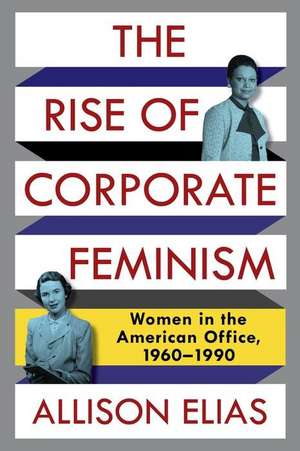The Rise of Corporate Feminism – Women in the American Office, 1960–1990: Columbia Studies in the History of U.S. Capitalism
Autor Allison Eliasen Limba Engleză Paperback – 5 dec 2022
| Toate formatele și edițiile | Preț | Express |
|---|---|---|
| Paperback (1) | 277.53 lei 6-8 săpt. | |
| Columbia University Press – 5 dec 2022 | 277.53 lei 6-8 săpt. | |
| Hardback (1) | 777.33 lei 6-8 săpt. | |
| Columbia University Press – 5 dec 2022 | 777.33 lei 6-8 săpt. |
Preț: 277.53 lei
Nou
Puncte Express: 416
Preț estimativ în valută:
53.11€ • 57.67$ • 44.61£
53.11€ • 57.67$ • 44.61£
Carte tipărită la comandă
Livrare economică 22 aprilie-06 mai
Preluare comenzi: 021 569.72.76
Specificații
ISBN-13: 9780231180757
ISBN-10: 0231180756
Pagini: 336
Dimensiuni: 152 x 229 x 17 mm
Greutate: 0.45 kg
Editura: Columbia University Press
Seria Columbia Studies in the History of U.S. Capitalism
ISBN-10: 0231180756
Pagini: 336
Dimensiuni: 152 x 229 x 17 mm
Greutate: 0.45 kg
Editura: Columbia University Press
Seria Columbia Studies in the History of U.S. Capitalism
Notă biografică
Allison Elias is an assistant professor at the Darden School of Business, University of Virginia.
Cuprins
Introduction
1. Feminist or Secretary?
2. At the Intersection of Sex Equality and Economic Justice
3. The Progressional and Professional Paths Intertwined
4. Overutilized and Underenforced
5. The Decline of the Office Wife and the Rise of the ¿Automated Harem¿
6. Could Pink-Collar Workers ¿Save the Labor Movement¿?
7. A Feminist ¿Brand Called Yoü
Epilogue
Acknowledgments
List of Archives and Repositories
Notes
Index
1. Feminist or Secretary?
2. At the Intersection of Sex Equality and Economic Justice
3. The Progressional and Professional Paths Intertwined
4. Overutilized and Underenforced
5. The Decline of the Office Wife and the Rise of the ¿Automated Harem¿
6. Could Pink-Collar Workers ¿Save the Labor Movement¿?
7. A Feminist ¿Brand Called Yoü
Epilogue
Acknowledgments
List of Archives and Repositories
Notes
Index
Descriere
Descriere de la o altă ediție sau format:
How did feminism in corporate America come to represent the individual success of the executive woman and not the collective success of the secretary? Allison Elias argues that feminist goals of advancing equal opportunity and promoting meritocracy unintentionally undercut the status and prospects of so-called “pink-collar” workers.
How did feminism in corporate America come to represent the individual success of the executive woman and not the collective success of the secretary? Allison Elias argues that feminist goals of advancing equal opportunity and promoting meritocracy unintentionally undercut the status and prospects of so-called “pink-collar” workers.














